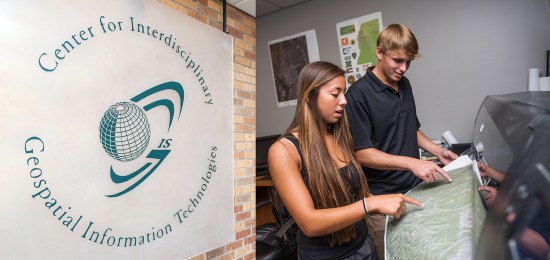 Delta State University’s Center for Interdisciplinary Geospatial Information Technologies will partake in the federal Centers for Academic Excellence in Geospatial Sciences Program.
Delta State University’s Center for Interdisciplinary Geospatial Information Technologies will partake in the federal Centers for Academic Excellence in Geospatial Sciences Program.The National Geospatial-Intelligence Agency, in partnership with the U.S. Geological Survey and the Dept. of Defense, recently selected Delta State University’s Center for Interdisciplinary Geospatial Information Technologies to partake in the Centers for Academic Excellence in Geospatial Sciences Program.
According to director Talbot Brooks, the center was encouraged to apply by the U.S. Marine Corps, which required a 100-page document detailing its curriculum, expertise and experience.
Delta State’s program represents one of 17 new academic institutions selected for the unique platform.
The program is a new endeavor designed to cultivate centers of academic excellence in geospatial sciences, content processing, tradecraft methodologies, and research and development technologies. NGA and USGS recognize the inherent value of investing in the future geospatial workforce, and the CAE Geospatial Sciences program supports that goal.
“Organizations were chosen through a rigorous multi-step peer-review process, and the status stands for three years,” said Brooks. “Selected organizations will benefit from not only notoriety, but the ability to compete for funding, train the federal GEOINT (geospatial intelligence) workforce, use NGA’s logo in association with our own, and the assignment of advisors to help guide further program development.”
The award was presented by NGA director Richard Cardillo at the GEOINT Forward meeting at the Washington Convention Center in Washington, D.C. on June 22.
“The CAE Geospatial Sciences program is a new way of cultivating relationships and partnerships across America’s universities,” said Dr. Lenora Peters Gant, NGA senior executive for academic outreach and STEM. “This program is one of the best strategic and systemic approaches to shape the geospatial intelligence workforce of the future.”
The CAE Geospatial Sciences Program provides NGA and USGS the ability to assess the university’s geospatial science curricula, research and development, and related capabilities that align with the agencies’ mission needs.
With these partnerships, the agencies can attract a broader array of geospatial intelligence, expertise, research and development, and talent sources for current and emerging critical mission challenges.
Brooks said the goal of the program is to build, strengthen and cultivate the current and future geospatial sciences workforce for the U.S. government — making it second to none.
Learn more about opportunities at Delta State’s Center for Interdisciplinary Geospatial Information Technologies at https://www.deltastate.edu/college-of-arts-and-sciences/center-for-interdisciplinary-geospatial-information-technologies/.

